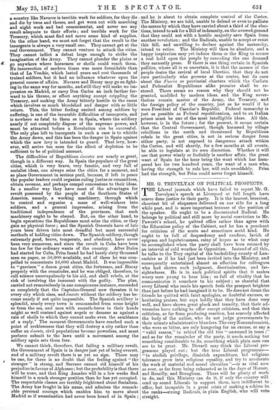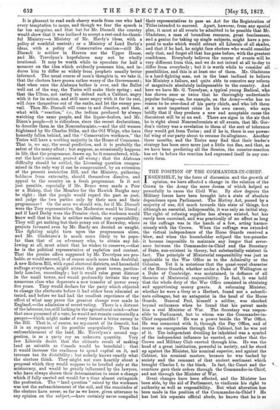MR. G. TREVELYAN ON POLITICAL PROSPECTS.
THE Liberal journals which have failed to report Mr. G. Trevelyan's speech at Liverpool at full length have scarce done justice to their party. It is the bravest, breeziest, cheeriest bit of eloquence delivered on our side for a long while past, and is more important because of the position of the speaker. He ought to be a discontented Radical. He belongs by political and still more by social conviction to Mr. Fawcett's school, he quitted office rather than agree with the Education policy of the Cabinet, and he has a penchant for criticism of the acute and sometimes acrid kind. He ought to be full of despondency and candour, lavish of epigram and lugubriousness, rainy of hopes as to what may be accomplished when the party shall have been retoned by an interval of cold weather in Opposition. Instead of all this, he talks to the Tory capital of the backsliding county of Lan- cashire as if he had just been invited into the Ministry, and consequently entertained almost an affection for colleagues who had shown such judgment, discrimination, and far- sightedness. He is in such political spirits that it makes weary men young to hear him ; so full of vitality that he communicates it somehow to his subject ; so cheerful that every Liberal who reads his speech feels the prospect brighter- than just before he had imagined it to be. He does not damn the friends he quitted with faint apologies, or doubtful excuses, or hesitating praises, but says boldly that they have done very well, and have shown great pluck and tenacity, that their ad- versaries have nothing to offer except criticism, and that this criticism, so far from producing reaction, has scarcely affected the body of the nation, who do not judge governments by their minute administrative blunders. The very Nonconformists, who were so bitter, are only hungering for an excuse, or say a " valid reason," to rebind the old ties "unwound in tears ;" and as for the remainder of the party, it needs nothing but something considerable to do, something which plain men can see to be great. Mr. Disraeli may think the Liberal pro- gramme played out ; but the true Liberal programme— "to abolish privilege, diminish expenditure, bid religions tolerance grow into religious equality, and try to accelerate the work of material and moral elevation "—is as vital now as ever, as far from being exhausted as in the days of Homer, and Romilly, and Brougham. There will be plenty of work to do, and this Ministry can do it, if only the country will send up sound Liberals to support them, men indifferent to-, office, but incapable in a great crisis of making a schism in the ranks—strong Radicals, in plain English, who will vote. straight. It is pleasant to read such cheery words from one who had every temptation to mope, and though we fear the speech is far too sanguine, and that but for Mr. Disraeli the country would show that it was inclined to accept a rest-and-be-thank- ful Ministry—a Ministry of Mr. Hardy's ideas, with a policy of wrathful content ; or a Ministry of Lord Derby's ideas, with a policy of Conservative caution—still Mr. Disraeli is neither in Heaven nor the Upper House, and Mr. Trevelyan's hopefulness may not be wholly irrational. It may be worth while to speculate for half a moment on the idea which evidently possesses him, and in- duces him to differ so widely from prophets usually better informed. The usual course of men's thoughts is, we take it, that the electors have grown rather weary of the Government ; that when once the Alabama bother is over, and the Ballot well out of the way, the Tories will make their spring ; and that the Ultras, not caring to defend such a Cabinet, angry with it for its action, and still more angry with it for its rest, will draw themselves out of the ranks, and let the enemy pre- vail. Then Mr. Disraeli will come in and dissolve, and then, what with "reaction," i.e., the tedium produced by always watching the same people, and the liquor-dealers, and Mr. Dixon's people—it is ridiculous, since the recent declarations, to describe them as the Nonconformists,—and the old women frightened by Sir Charles Dilke, and the Old Whigs, who have honestly fallen behind, and the "Conservative workmen," the Tories will have a working majority in the House of Commons. That is, we say, the usual prediction, and it is probably the safest of the many afloat ; but suppose, as occasionally happens in life, that the programme, drawn up, be it remembered, with- out the host's consent, proved all wrong ; that the Alabama difficulty should be settled, the Licensing question compro- mised in the only way it can be compromised, by an extension of the present restrictive Bill, and the Ministry, gathering boldness from extremity, should themselves dissolve, and appeal to the country on a fresh programme. Is it not just possible, especially if Mr. Bruce were made a Peer or a Bishop, that the Member for the Hawick Burghs may be right ; that the people would regard the past as past, and judge the two parties only by their men and their programmes ? On the men we should win, for if Mr. Disraeli were the Tory representative, the Moderates would be liberal ; and if Lord Derby were the Premier elect, the workmen would know well that in him is neither socialism nor squeezability. They will get nothing but their penny out of Knowsley, where projects favoured even by Mr. Hardy are decried as naught. The fighting might turn upon the programmes alone, and Mr. Gladstone's is much more likely to be popu- lar than that of an adversary who, to obtain any fol- lowing at all, must admit that he wishes to conserve,—that he is the political representative of repletion and content. That the precise offers suggested by Mr. Trevelyan are pro- bable, or would succeed, is of course much more than doubtful. A new Reform Bill, with equal electoral districts, and household suffrage everywhere, might attract the great towns, particu- larly London, exceedingly ; bat it would raise great distrust in the small towns, and would profoundly irritate the very numerous class who deprecate a new transfer of power every five years. They would declare for the party which objected to change the electorate before it had either been educated or tested, and before we had had the smallest experience of the effect of what may prove the greatest change ever made in England,—the admission of secret voting. There is a distrust of the labourer, too, still lurking in the agricultural mind—a fear that once possessed of a vote, he would not remain contentedly a pauper—which might make of every farmer a bitter enemy to the Bill. That is, of course, no argument of its demerit, but it is an argument of its possible unpopularity. Then the enfranchisement of the land, Mr. Trevelyan's second sug- gestion, is as a party cry an unknown quantity. Very few Liberals doubt that the ultimate result of making land as saleable as Consols would be beneficial ; that it would increase the readiness to spend capital on it, and increase too its divisibility ; but nobody knows exactly what the electors think. They might not care heartily about a proposal which they would suppose to be levelled only at the aristocracy, and would be greatly influenced by the lawyers, who have always shown their determination to resist a change which if fully carried out would for a time almost extinguish the profession. The "land question" raised by the workmen was not the enfranchisement of the soil, and the remainder of the electors have never, so far as we know, given utterance to any opinion on the subject,—have certainly never compelled
their representatives to pass an Act for the Registration of Titles intended to succeed. Apart, however, from any special plan, it must at all events be admitted to be possible that Mr. Gladstone, a man of boundless resource, great fearlessness, and a genius for taking up single subjects, might have a pro- posal to make which would attract all Liberals of all shades, and that if he had, he might face electors who would consider only that, and forget all that has gone before, with the greatest confidence. Everybody believes the course of events will be very different from this, and we do not intend at all to-day to differ from everybody ; but it is worth while to consider all possibilities, and this is at least one of them. Mr. Gladstone is a hard-fighting man, not in the least inclined to believe his Ministry a failure, and quite able to conceive any reform of magnitude absolutely indispensable to the country. And here we have Mr. G. Trevelyan, a typical young Radical, who has shown once or twice that he thoroughly understands popular feeling—as, for example, on the Army—who has no reason to be over-fond of his party chiefs, and who left them at a most important crisis in his own career, who says boldly that if they produce a new and acceptable cause the discontent will be at an end. There are signs in the air that he is right about Nonconformists at all events, that Mr. Gor- don's victory was a revelation to them of the sort of tolerance they would get from Tories ; and if he is, there is one power- ful wing of our party about to resume its allegiance. Another three months, and the Tories may find that their leader's strategy has been once more just a little too fine, and that, as we have been predicting all the Session, the counter-reaction has set in before the reaction had expressed itself in any con- crete form.



































 Previous page
Previous page